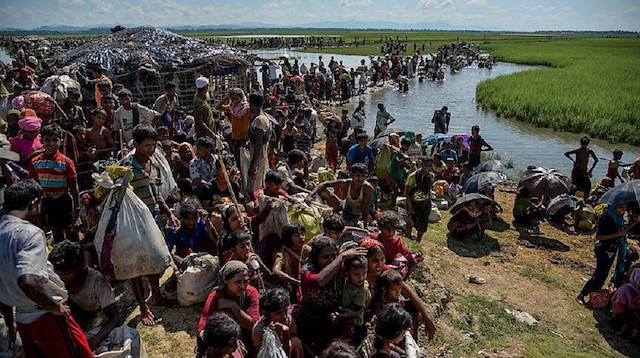
Myanmar and Bangladesh should work to create conditions conducive to a safe and dignified return, says Crisis Group
The Brussels-based think tank International Crisis Group (ICG) urged Bangladesh to halt the plan to return Rohingya refugees to Myanmar.
In a statement titled "Bangladesh-Myanmar: The Danger of Forced Rohingya Repatriation" on Monday, the group criticized the deal between Myanmar and Bangladesh for the Nov. 15 repatriation of more than 2,000 Rohingya refugees.
“Myanmar and Bangladesh should halt the plan and instead work to create conditions conducive to a safe and dignified return,” the ICG said.
It warned a forced repatriation carried serious risks for security and stability on both sides of the border and would escalate tensions in the camps as well as leading to confrontations between the refugees and Bangladeshi security forces.
“If refugees fear that they will be forced back to Myanmar, they may become more desperate to leave the camps and to attempt dangerous sea journeys across the Bay of Bengal to Thailand, Malaysia, Indonesia or other countries," read the statement. "This could have wider regional implications, as it did during the maritime migration crisis of 2015."
The global advocacy body also called on the UN and its refugee agency to continue to "firmly oppose the repatriation in public and in private and use its influence in both countries to halt the process."
"The U.S., European Union (EU), Australia, Canada, and others also should press Bangladesh and Myanmar to halt the returns and instead work to create conditions conducive to voluntary repatriation; those countries’ participation at the 11-15 November ASEAN summits in Singapore is an opportunity to do so," it said.
The Rohingya, described by the UN as the world's most persecuted people, have faced heightened fears of attack since dozens were killed in communal violence in 2012.
Since Aug. 25, 2017, nearly 24,000 Rohingya Muslims have been killed by Myanmar’s state forces, according to a report by the Ontario International Development Agency (OIDA).
More than 34,000 Rohingya were also thrown into fires, while over 114,000 others were beaten, said the OIDA report, titled "Forced Migration of Rohingya: The Untold Experience."
Some 18,000 Rohingya women and girls were raped by Myanmar’s army and police and over 115,000 Rohingya homes were burned down and 113,000 others vandalized, it added.
According to Amnesty International, more than 750,000 Rohingya refugees, mostly children, and women, fled Myanmar and crossed into neighboring Bangladesh after Myanmar forces launched a crackdown on the minority Muslim community in August 2017.
The UN has documented mass gang rapes, killings -- including of infants and young children -- brutal beatings, and disappearances committed by Myanmar state forces. In a report, UN investigators said such violations may have constituted crimes against humanity.








